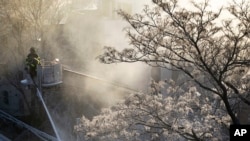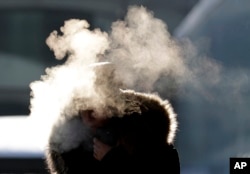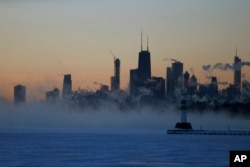Officials say as many as 11 people in the United States have died this week due to record-low winter temperatures that have made even quick trips outside dangerous and could cause frostbite within minutes.
Classes were canceled at the University of Iowa in Iowa City, where a student was found in distress behind a campus building in extreme weather conditions. The wind chill when the student was found was minus-46 Celsius; the student later died at the hospital.
In Moline, Illinois, the temperature dropped to minus-36 degrees Celsius on Thursday. In Norris Camp, Minnesota, temperatures dropped to minus-44 degrees Celsius Wednesday, making it the coldest location in the United States and one of the coldest spots on Earth at that time.
Below-freezing temperatures put the town of Hell, Michigan, in the news this week, with news stories reporting that Hell had "frozen over," referencing a popular American joke about an event that is unlikely to happen.
Mail service, as well as planes, trains and buses were suspended in the past two days in deference to the record-setting weather. In Chicago, both the blockbuster musical "Hamilton" and popular ice skating show "Disney on Ice" were canceled due to the weather.
In Detroit, automobile manufacturing plants were shut down mid-week to protect workers and conserve energy.
The high demand for power caused outages in Wisconsin and Iowa, and the governors of Wisconsin and Michigan declared states of emergency and ordered all state governments closed.
Officials said temperatures were below the freezing mark in 85 percent of the country, excluding Alaska and Hawaii.
Downtown Chicago streets were largely deserted after most offices told employees to stay home. Trains and buses operated with few passengers; engineers set fires along tracks to keep commuter trains moving. The hardiest commuters ventured out only after covering nearly every square inch of flesh to protect against the extreme chill, which in minutes froze ice crystals on eyelashes and eyebrows.
The city used transit buses, with nurses on board, as emergency warming centers for the homeless.
Doctors in Minneapolis said they were treating cases of what they called fourth-degree frostbite, in which limbs are frostbitten down to the bone.
Mail carriers, known for making deliveries through rain, sleet and snow, drew the line at life-threatening cold. The U.S. Postal Service canceled mail service in parts of 11 states Wednesday.
Meteorologists blamed the weather on a breakup of the polar vortex — cold air above the North Pole that has been pushed south across North America because of a blast of desert heat from North Africa.
Experts said it was possible that climate change was playing a part in the extreme cold. But they said it was hard to pinpoint the cause of a single weather event such as this week's cold blast.
"It is not out of bounds with the historical record," University of Miami professor Ben Kirtman said. "You get storms that are bigger than other storms. There is a big part of this that is part of the natural variability of the climate."
Government scientists said increased moisture in the atmosphere because of global warming might bring on a higher number of severe snowstorms in the winter and more powerful hurricanes in the summer.
This week's cold weather will be just a memory within a few days. Forecasters predicted chilly but above-freezing temperatures on Sunday and Monday in the Midwest and in the eastern United states.







